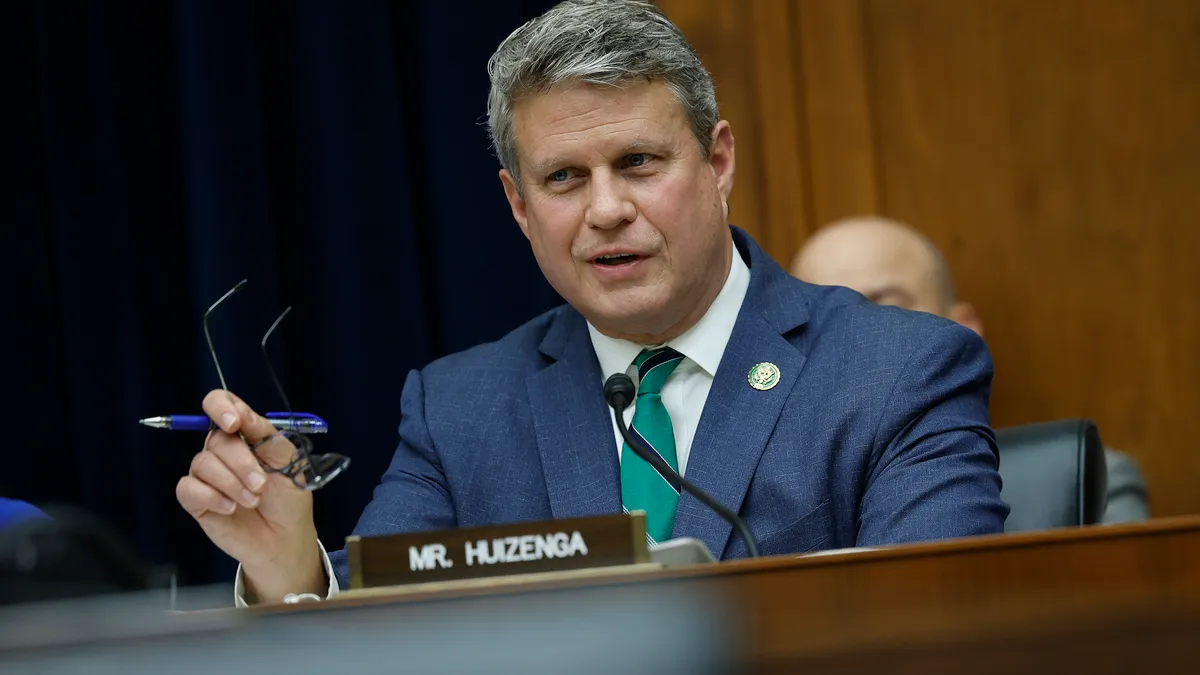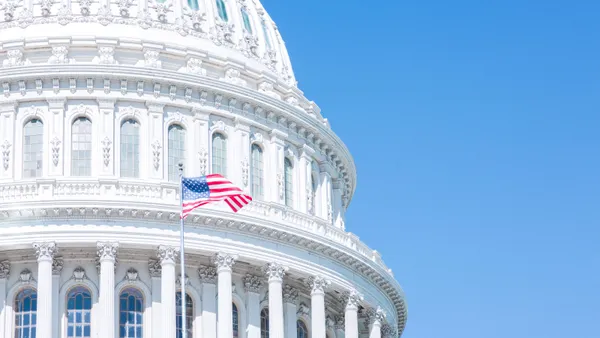Dive Brief:
- Republicans on the House Financial Services Committee argued Thursday that the Securities and Exchange Commission’s upcoming rule requiring businesses to submit climate-related disclosures oversteps its authority, in light of recent U.S. Supreme Court and federal appeals court decisions.
- The hearing, led by the Oversight and Investigations Subcommittee, sought to examine whether the Supreme Court’s decision in West Virginia v. Environmental Protection Agency and an October decision by the Fifth Circuit Court of Appeals give credence to the majority’s belief the agency is outside its rulemaking authority with the climate disclosure rule.
- George Georgiev, associate professor at Emory University School of Law, told the committee the SEC’s remit for implementing new regulations goes back to the 1930s and said since then, rather than look to restrict the agency’s authority, “Congress has only encouraged the SEC to continue with the disclosure regime, which is a hallmark of successful capital markets.”
Dive Insight:
Rep. Bill Huizenga, a Michigan Republican and chair of the Oversight and Investigations Subcommittee, said the hearing was not meant to be confused with a debate on climate change, but rather “whether the Securities and Exchange Commission has the legal authority to mandate climate disclosures.”
The committee pointed to the Supreme Court’s decision in West Virginia v. EPA, which leaned on an interpretation of administrative law that Congress cannot delegate issues of major political or economic significance to agencies, and argued the climate disclosure rule falls within the bounds. Additionally, the Fifth Circuit ruling found the SEC had violated the Administrative Procedure Act in reviewing a share repurchase disclosure rule by failing to adequately respond to comments and conducting a proper cost-benefit analysis.
Charles Crain, vice president of domestic policy for the National Association of Manufacturers, testified before the committee that “there are some real parallels” between the Fifth Circuit’s ruling on the share repurchase rule and the agency’s process in the climate disclosure rule.
Crain said the agency has not fully considered the impacts the rule will have on private companies, especially those that will get pulled in under the scope 3 disclosure mandate. He added the cost-benefit analysis does not include projected costs of smaller companies having to spend more on compliance should they exist in a larger, public company’s value chain.
“A key failing that the Fifth Circuit identified was the SEC's lack of a robust cost-benefit analysis,” Crain said. “And that's exactly what we're seeing with the climate rule: A failure to consider key aspects of the impact that it will have on businesses, especially smaller private businesses.”
Huizinga said the SEC has “wildly underestimated the costs” it will impose on public and private companies and Congress has not given the SEC authority to mandate climate disclosures.
Lawrence Cunningham, special counsel for law firm Mayer Brown and professor emeritus at George Washington University, served as a witness for the committee’s majority — along with Crain and a representative from the family-run Schultz Fruitridge Farms — and said the EPA should handle climate-related disclosures, not the SEC.
“The proposal is unnecessary and harmful because existing SEC guidance … already requires companies to disclose all climate risks that are material to their businesses,” Cunningham said. “And yet the proposal would require irrelevant and burdensome disclosure outside the SEC’s expertise and authority.”
Georgiev, called by the committee’s Democrats, said all issues that involve climate change should not be left to the EPA or the National Oceanic and Atmospheric Administration to solve. He added that, as far as all the hand-wringing on the potential inclusion of scope 3 disclosures, judgment should be reserved for the final rule.
Georgiev said no court has ever invalidated an SEC rule for exceeding disclosure authority, and the climate disclosure rule is about giving investors reliable information in the pursuit of greater market efficiency.
“[The rule] is not about regulating climate change,” Georgiev said. “It does not seek to effectuate substantive regulation of climate. And moreover, the SEC cannot do that, even if it wanted to. It's merely about information.”
Republican opponents of the SEC’s climate rule have received more than $150 million in career donations from the oil and gas industry, according to a report released Thursday by Unlocking America’s Future, a pro-ESG 501(c)4. The report found that 241 Republican senators, representatives or statewide officials have received donations from the oil and gas or other polluting industries and lodged public opposition to the climate disclosure rules, its inclusion of scope 3 disclosures or both.
















